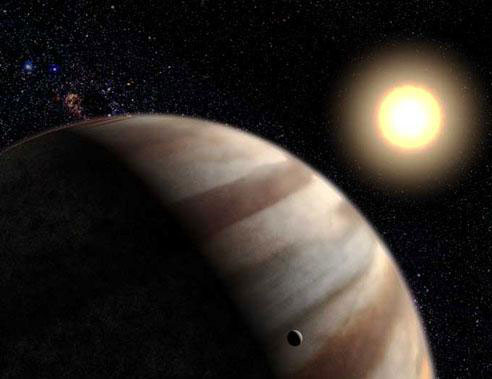Discovered 'stunned' about planet formation
Planets can orbit their stars in the opposite direction to the one we have known in the solar system.

Illustration.
The discovery was staggering in the world of scientific science of the Observatory of the University of Geneva, Switzerland, because it reconsidered the doctrine of forming previously recognized planets.
The results of 27 extrasolar planets have surprised astronomers from the University of Geneva. Six of the 27 planets did not revolve around their stars in the way we used to know in the solar system but in the opposite direction.
Swiss scientists believe that the findings will force the scientific world to review their theories about the formation of planets.
Previously, planets formed in disks of dust and gas revolving around their young stars. The disk and the star simultaneously revolve around the same axis.
Astronomers speculate that planets are formed in this dish and still rotate in the same direction around their star. This is the case in our solar system.
However, new findings by Swiss scientists say the opposite of this view. This finding will no longer be compatible with the doctrine that has been recognized so far, but it helps explain the phenomenon of certain types of extrasolar planets found on a rotating axis close to their throne.
Researchers from the Geneva Observatory have proposed a complex alternate theory to explain this process. However, this doctrine will lead to a resumption of research into life in the universe.
- The process of forming giant planets in the universe
- The planet is 2,500 times larger than Earth
- The planet has ... 3 suns
- Discover a new planet
- Detect strange planet
- Young alien planet promises to decode the formation of planets
- Storms are the origin of planet formation
- Discover the astonishment of the planet's formation
- Discover a new planet 13 times larger than Jupiter
- The conceived planet is still attached to the star mother belt
- First observed the process of conception of a planet
- Discovering the planet can survive life
 Van Allen's belt and evidence that the Apollo 11 mission to the Moon was myth
Van Allen's belt and evidence that the Apollo 11 mission to the Moon was myth The levels of civilization in the universe (Kardashev scale)
The levels of civilization in the universe (Kardashev scale) Today Mars, the sun and the Earth are aligned
Today Mars, the sun and the Earth are aligned The Amazon owner announced a secret plan to build a space base for thousands of people
The Amazon owner announced a secret plan to build a space base for thousands of people